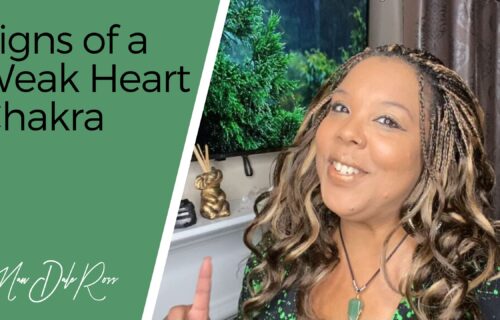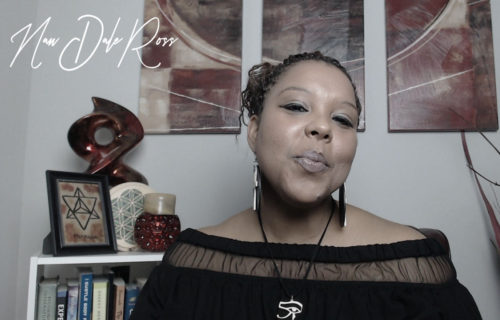
Signs of Weak Root Chakra
In this video, I’m going to help you understand what is the Root Chakra, its associated organs and muscle, emotional symptoms and physical pain link to the Root chakra so you can find the clue in where you need healing.
What are Chakras?
Chakras are spinning energy centers in our body that corresponds to our nerve centers. Each chakra is linked to an associated organ, glands or muscle as well as the psychological, emotional and spiritual state of being.
There is seven major chakra that runs on its own vibratory level that transmits and receive energy that matches its frequencies. This energy center stores our stories, wounds, past experiences, and pattern throughout our body that directed tied to childhood conditioning, past experiences as well as inherited energy.
When there’s an imbalance (blocked) in the chakra – energy can not flow freely, therefore, causing a physical imbalance (pain) in the organ associated with the energy center as well as the emotions that a vibratory match.
Once you have an understanding of the location of your chakra, you become adept at locating old wounds and releasing that blockage. That’s why is so important for these 7 energy center to be aligned and balanced to allow Prana to flow easily for a healthy and balanced existence.
When we can locate the old wounds and address them healing can occur.
Root Chakra – Security and Connection
The root chakra is the foundation for building a fulfilling life and the root for opening the others chakras. It’s located at the base of the spine, along with the first three vertebrae, at the pelvic plexus and usually associated with the color red. This 1st energy center has a tremendous amount of creative energy
The key characteristics of the Root Chakra:
- Physical survival
- Safety
- Security
- Grounding
- Fight or flight response
- Sexuality
Root Chakra Body System: Reproductive organs – primarily for male (testes), Large Intestines, Bladder, Excretory System and Adrenal glands
The root chakra is the most important chakra because it governs the life lessons of surviving the material world. When our root chakra is balanced; our basic needs such as food, water, shelter and safety are met; therefore we feel more grounded, secure and worry less about survival. The balanced root chakra allows us to trust in our high self so we can feel safe in exploring other aspects of life (career, money, relationships with others). A balance root chakra allows us to develop a harmonious relationship with our environment giving us a sense of safety with other people.
How we feel about our security is deeply rooted from a stimuli from our childhood. If during our childhood our parents or caretaker provided what we need to survive on a consistent basis; we felt secure in the world. However; if during our childhood our caretaker struggled in giving you what you need to survive; or abandonment in adolescent years, this chakra can become blocked or weak.
When our root chakra is underactive (depleted energy) we have the emotions of “fear of surviving”. This is where our fight or flight response kicks in causing us to be in survival mode. That fight and flight is a process initiated by the nervous system when your body encounters a stressful situation. When this foundation is weak; it creates emotional symptoms pertaining to financial security. You may fear success or failure. You will perceive a lack of financial support (feel as though you are struggling alone) or emotional support (victim mentality)
On an emotional level; an underactive root chakra:
- Feel lack of physical vitality
- Excessive feeling of insecurities
- Anxiety/Depression/Paranoia
- Lack of focus and/or discipline
When the root chakra is overactive (excess energy); we become overly consumed with outside influences to fill the void of insecurity. Since anger and fear are part of your survival mechanism, we may be obsessive with money, sex, and material possessions. An overactive root chakra can result in feeling stuck in the same job or same routine.
On an emotional level; an overactive root chakra:
- Feeling anger
- Short temper
- Greed
- Materialistic
- Overactive sex drive
- Sex addiction
On a physical level, a damaged root chakra not only affect our lower part of the body but affect our adrenal glands, responsible for how our body react and respond to stress. When our adrenal glands secrete “stress” hormones for a long period of time, our root chakra energy center become shocked and depleted of its vital energy. Resulting in physical imbalance and problems in the colon, bladder, elimination, lower back, legs or feet issues and eating disorders. A prostate problem can occur in men.
Physical symptoms can occur such as :
- Lower back pain
- Muscle spasm
- Leg and calves cramps
- Knee and feet pain
- Low sex drive/libido
- Kidney infection
- Bladder irritation
Back Side: reflects our private and unconscious elements of your life. This side stores everything you don’t want to deal with or don’t want other people to see. That means there’s a lot of negative emotions stored along with our spine and back of our legs. The most powerful emotions such as anger and fear are stored in our back.
Lumbar (lower) vertebrae and Tailbone: Can affect the reproductive organs, hips, large intestines, immune system, kidneys, and bladder. Since this area of the body (Root Chakra) relates to safety and security, consequences of your childhood as well as issues that make you feel threatened or insecure. Since the lower vertebrae support our spine and torso, this area is where family and security issues surface.
Hips, legs, and calves: Is how you move forward in life. Your legs, calf, and feet store much of your trauma, resentment, jealousy, and emotional pain both past and present especially in regard to your family. You may feel stuck and unable to move forward. You may not feel any support in your life – as though you are the one supporting everyone else or you cannot support yourself.
Knees and Feet: Since the vibration of negative emotions is lower and denser; causing feeling to drop to the lowest part of our body….our feet. Inflammation shows you are nursing hurt feelings. Stubborn, inflexible resentment goes to the knee and joints, this part of the body is designed to be open and flexible.
Are you hold on to the past and supporting the heavy weight of this burden?
Are you rigid, inflexible and unforgiving?




Add A Comment